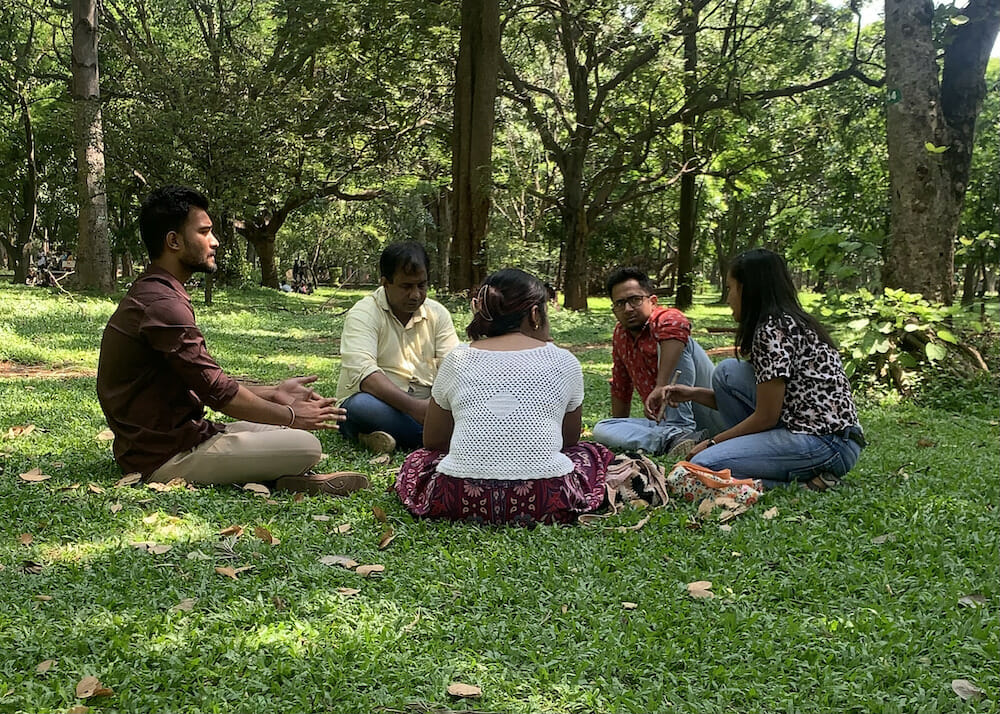On a sunny Sunday morning, May 28th, a group of enthusiastic citizens gathered at Cubbon Park for a community meet-up, organised by Jhatkaa.org, a digital campaigning organisation that empowers citizens using technology to take action on issues that matter to them. The community included individuals who had signed up to volunteer with Jhatkaa in verticals, such as air pollution, gender, sexuality, and policy making.
The common goal was to address various pressing issues in Bengaluru, such as street lights, traffic management, and conserving the environment. Over 20 people came together to share their concerns and discuss solutions. The event not only fostered a sense of unity, but also highlighted the power of citizens’ support and cooperation with authorities in transforming hypothetical solutions into reality.
“Attending the meet made me realise that there are more like-minded people who feel the same way, and together we hope to work in collaboration with the civic authorities for better ease of living in Bengaluru,” says Nandini Iyer, an attendee.
Read more: How community learning centres are bridging the gaps in Bengaluru’s education infrastructure
Sharing concerns: A platform for discussing issues
The meet-up began with participants sharing their concerns about the state of the city. Street lights were a major topic of discussion, as many areas lacked proper lighting, making it unsafe for pedestrians at night. “The roads leading up to Jakkur lake are extremely poorly lit. Inadequate street lighting is not just a matter of inconvenience, but a matter of survival – especially for women and their daily mobility,” say some residents of Yelahanka.
Traffic congestion was another issue that burdened the daily lives of citizens, leading to frustration and wasted time. The group also expressed their worries about the diminishing green cover, emphasising the need to preserve trees.

Brainstorming solutions and citizen-driven initiatives
After sharing their concerns, the participants delved into brainstorming plausible solutions to address the identified issues. The discussions were lively, with diverse perspectives contributing to a comprehensive list of ideas. Some proposed initiatives included:
- Collaborating with local authorities: It was unanimously agreed upon that citizen
involvement should go hand in hand with cooperation from relevant authorities. By building a strong partnership, we could amplify our impact and ensure the efficient implementation of proposed solutions. - Street light adoption programme: Participants suggested forming a citizen-led
initiative to adopt and maintain street lights in areas with inadequate lighting. Through donations and volunteer efforts, street lights could be installed and maintained, making the city safer for everyone. - Traffic management campaigns: To tackle traffic congestion, the group discussed organising awareness campaigns to promote responsible driving, carpooling, and public transportation. Engaging with traffic police and local transportation authorities would be crucial in implementing these campaigns effectively.
- Tree plantation drives: Recognising the importance of a green environment, the participants envisioned organising tree plantation drives in collaboration with local NGOs, street vendors and municipal bodies. By involving citizens in these initiatives, we could ensure the growth and maintenance of trees and plants in various parts of the city.
Read more: Classical dance brings Whitefield community together
Turning hypothetical solutions into reality: Citizen-Authority cooperation
While the proposed solutions seemed idealistic, the group acknowledged that their successful implementation relied on the collective efforts of citizens and the cooperation of authorities. It was emphasised that citizens should actively participate in these initiatives and take ownership of their neighbourhoods. By engaging with local authorities and elected representatives, we could garner support and resources to bring our ideas to fruition.
Restoring faith: Citizens’ love for Bengaluru
The community meet-up served as a testament to the unwavering love citizens have for their city. By coming together and discussing ways to address issues, the community displayed a shared commitment to creating a better Bengaluru. The event not only restored faith in the power of collective action but also highlighted the immense potential of citizens when they unite for a common cause.
Looking ahead: Monthly meet-ups and expanding participation
The success of the community meet-up at Cubbon Park laid the foundation for future gatherings. The participants expressed their enthusiasm for turning this event into a monthly affair, with each meet-up focusing on specific issues. Moreover, the group expressed their desire to expand participation, encouraging more people from different backgrounds to join and contribute their ideas and efforts. By diversifying the pool of participants, the community could benefit from fresh perspectives and innovative solutions.
The meet-up showcased the power of citizens when they unite to address issues plaguing their city. Through the exchange of concerns, brainstorming solutions, and emphasising citizen-authority cooperation, the event demonstrated how hypothetical ideas can become a reality. With the resolve to continue these gatherings on a monthly basis and welcome more participants, the community is set on a path to create a brighter and more sustainable future for Bengaluru.